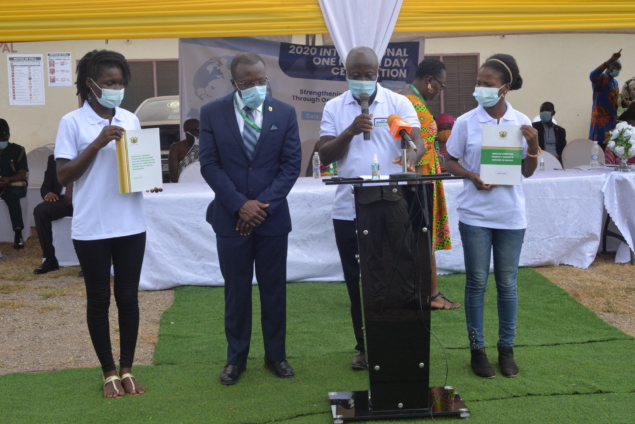The Ghana Health Service, in partnership with the US Aid Agency, USAID, has launched two risk communication documents to improve communication and social mobilization during public health emergencies.
The first document is the National Standard Operating Procedures for Risk Communication and Social Mobilization During Public Health Emergencies.
It provides systematic guidelines on the processes to be followed for coordination and timely risk communication and social mobilization responses during the preparedness, active response and post response phases of all public health emergencies.
The second is the Message Guide for Priority Zoonotic Diseases in Ghana. This is a tool used as reference guide for designing and sharing accurate and standardized messages about the prioritized zoonotic diseases in Ghana requiring greater attention from all stakeholders.
Pro Vice-Chancellor at the KNUST, Prof Ellis Owusu-Dabo, says “the tools will propel Ghana towards achieving a number of core capacities needed to effectively detect, prevent, detect and respond to infectious disease threats as measures during the joint External Evaluation conducted by the WHO for Ghana in 2017.”
He has assured of KNUST’s preparedness to ensure effective utilization of the tools.
“KNUST will continue to engage with One Health partners to strengthen research on One Health and orient members of the University community to enhance understanding and application of these tools,” he said.
Prof. Owusu-Dabo was speaking at the 2020 International One Health day at Boadi in the Ashanti region.
The goal of this year’s One Health Day is to build the cultural will necessary for a change in how one health challenges are assessed and addressed.
The One Health Technical Working Group with support from the development partners including FAO, WHO and USAID are at the final stage of formulating the National One Health Policy.
This will formalize collaboration and coordination among the human, animal and environment sectors.
Regional Manager for the Emergency Centre for Transboundary Animal Disease West and Central Africa of the FAO, Baba Soumare pledged their commitment to continuous collaboration with KNUST.
His speech was read by Dr. Garba Ahmed, FAO country team leader.
“The school of veterinary medicine participated in the FAO training for veterinary meat inspectors and butchers on meat inspection to ensure meat safety to the public. FAO will continue to explore other areas for collaboration with KNUST,” he said.
Latest Stories
-
Gold Fields Ghana Foundation challenges graduates to maximize benefits of community apprenticeship programme
49 mins -
GBC accuses Deputy Information Minister Sylvester Tetteh of demolishing its bungalow illegally
1 hour -
Boost for education as government commissions 80 projects
1 hour -
NAPO commissions library to honour Atta-Mills’ memory
1 hour -
OmniBSIC Bank champions health and wellness with thriving community walk
1 hour -
Kora Wearables unveils Neo: The Ultimate Smartwatch for Ghana’s tech-savvy and health-conscious users
1 hour -
NDC supports Dampare’s ‘no guns at polling stations’ directive
2 hours -
Police officer interdicted after video of assault goes viral
2 hours -
KNUST’s Prof. Reginald Annan named first African recipient of World Cancer Research Fund
2 hours -
George Twum-Barimah-Adu pledges inclusive cabinet with Minority and Majority leaders
3 hours -
Labourer jailed 5 years for inflicting cutlass wounds on businessman
3 hours -
Parliament urged to fast-track passage of Road Traffic Amendment Bill
3 hours -
Mr Daniel Kofi Asante aka Electrician
3 hours -
Minerals Commission, Solidaridad unveils forum to tackle child labour in mining sector
3 hours -
Election 2024: Engagement with security services productive – NDC
3 hours

